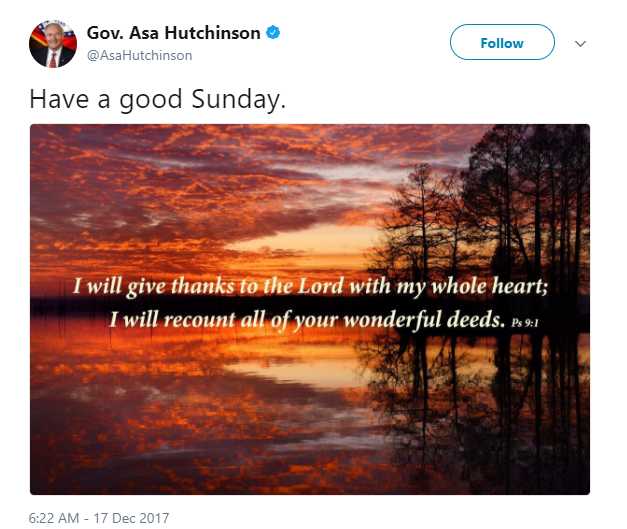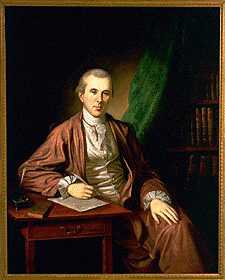 LITTLE ROCK, Ark. — One of the most conspicuous professing atheist groups in the nation has sent a letter to the governor of Arkansas to request that he stop posting Bible verses on his government-related social media pages.
LITTLE ROCK, Ark. — One of the most conspicuous professing atheist groups in the nation has sent a letter to the governor of Arkansas to request that he stop posting Bible verses on his government-related social media pages.
Gov. Asa Hutchinson posts a Scripture to his Twitter and Facebook accounts each Sunday, sharing verses such as, “I will give thanks to the Lord with my whole heart; I will recount all of Your wonderful deeds,” “Whoever dwells in the shelter of the Most High will rest in the shadow of the Almighty,” and “Before the mountains were brought forth, or ever You had formed the earth and the world, from everlasting to everlasting, You are God.”
However, the Wisconsin-based Freedom From Religion Foundation (FFRF) soon learned of his practice and sent a letter to the governor on Tuesday to assert that it is unconstitutional to post Scripture to his official government accounts.
“Government officials cannot endorse religion, including by regularly publishing Bible verses,” wrote attorney Andrew Seidel. “When it comes to violations of the Establishment Clause, i.e., the government endorsing religion, appearances matter. Government officials cannot appear to endorse Christianity.”
“In this instance, by tying your government office title to two social media pages, you have intimately entwined your official position with the messages you send on those platforms, creating the appearance of official endorsement,” he stated.
FFRF then requested that Hutchinson cease posting Scripture to social media, or to at least do so on personal accounts that are separate from his government pages.
“The simplest solution is to stop posting and tweeting Bible verses or any other religious endorsements and to delete those previously disseminated,” Seidel asserted. “If you cannot refrain from using social media to promote your personal religion, then you should open other, personal social media accounts for your personal thoughts, musings, prayers, and Bible verses and leave all your official business for the accounts mentioned above.”
He also contended that Jesus’ exhortation not to make an ostentatious show out of prayer just to be seen by others would also pertain to posting Scriptures publicly.
“If the law and your oath to uphold the Constitution are not sufficient to convince you to stop, perhaps you might consider reading Matthew 6:5-6, in which Jesus condemns public prayer as hypocrisy in his Sermon on the Mount,” Seidel stated. “None of Jesus’s supposed words mention Twitter—perhaps He wasn’t that prescient—but the condemnation of public piety is reasonably clear.”
It is not yet known if Hutchison plans to respond to the correspondence. (Read the letter in full here.)

Dr. Benjamin Rush, signer of the Declaration of Independence and founder of the Bible Society at Philadelphia, said in 1806, “The only foundation for a useful education in a republic is to be laid in religion. Without this there can be no virtue, and without virtue there can be no liberty, and liberty is the object and life of all republican governments.”
He also wrote in a letter to John Adams in 1807, “By renouncing the Bible, philosophers swing from their moorings upon all moral subjects. Our Saviour in speaking of it calls it ‘Truth,’ in the abstract. It is the only correct map of the human heart that ever has been published. It contains a faithful representation of all its follies, vices & crimes. All systems of religion, morals, and government not founded upon it, must perish, and how consoling the thought!—It will not only survive the wreck of those systems, but the world itself. ‘The gates of Hell shall not prevail against it.'” (Read here from the National Archives.)
Throughout America’s early history, a number of other Founding Fathers issued proclamations calling inhabitants to prayer, including in 1798, when the aforementioned President John Adams proclaimed a national day of humiliation, prayer and fasting.
“As the safety and prosperity of nations ultimately and essentially depend on the protection and blessing of Almighty God, and the national acknowledgment of this truth is not only an indispensable duty which the people owe to Him,” he wrote, “…this duty, at all times incumbent, is so especially in seasons of difficulty and of danger, when existing or threatening calamities—the just judgments of God against prevalent iniquity—are a loud call to repentance and reformation.”
President Abraham Lincoln also proclaimed a National Fast Day in 1863.
“[I]t is the duty of nations as well as of men to own their dependence upon the overruling power of God, to confess their sins and transgressions in humble sorrow, yet with assured hope that genuine repentance will lead to mercy and pardon; and to recognize the sublime truth, announced in the Holy Scriptures and proven by all history, that those nations only are blessed whose God is the Lord,” his proclamation read.
“[I]nsomuch we know that by His Divine law, nations like individuals are subjected to punishments and chastisements in this world, may we not justly fear that the awful calamity of civil war, which now desolates the land, may be but a punishment inflicted upon us for our presumptuous sins, to the needful end of our national reformation as a whole people,” Lincoln said.
Become a Christian News Network Supporter...


